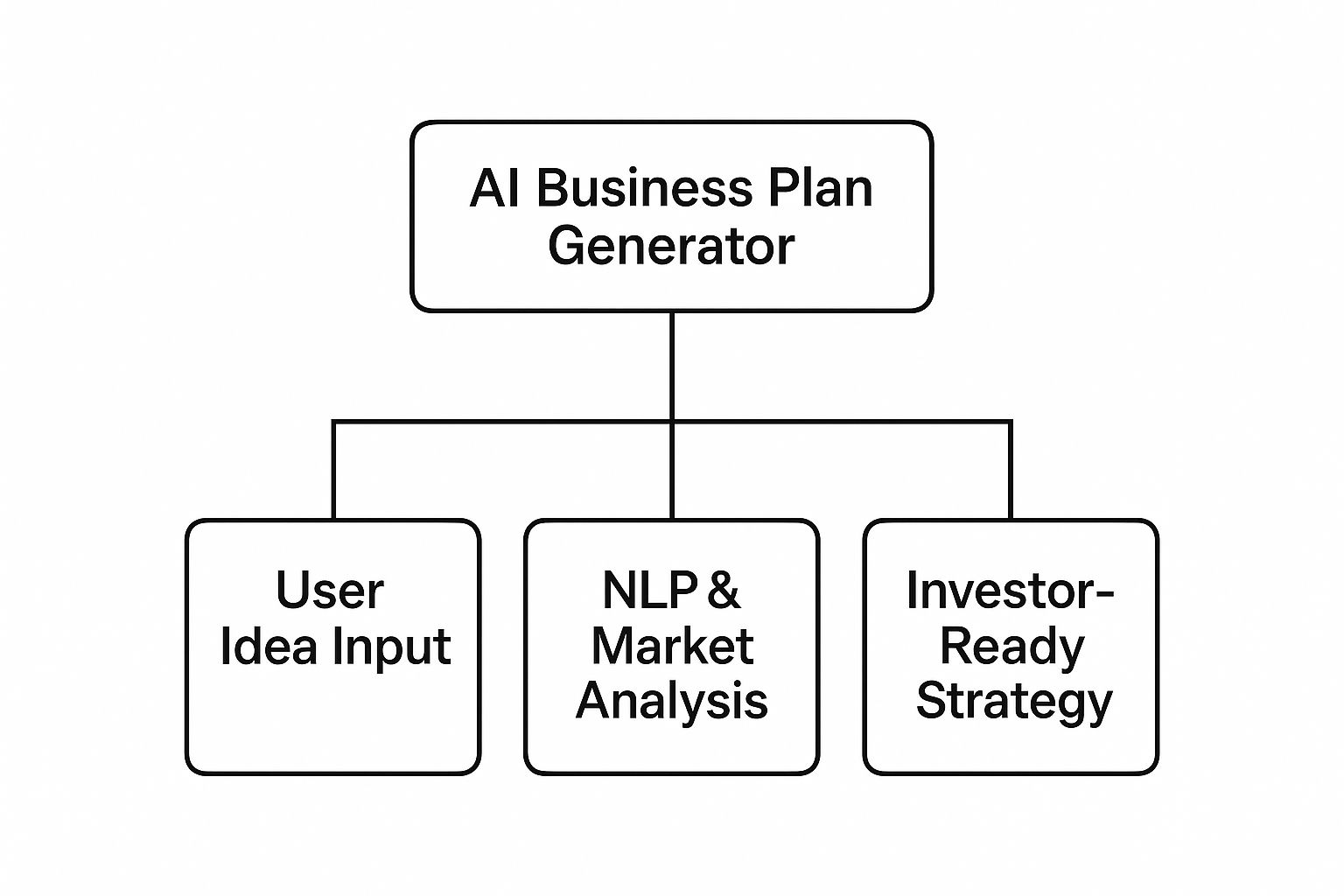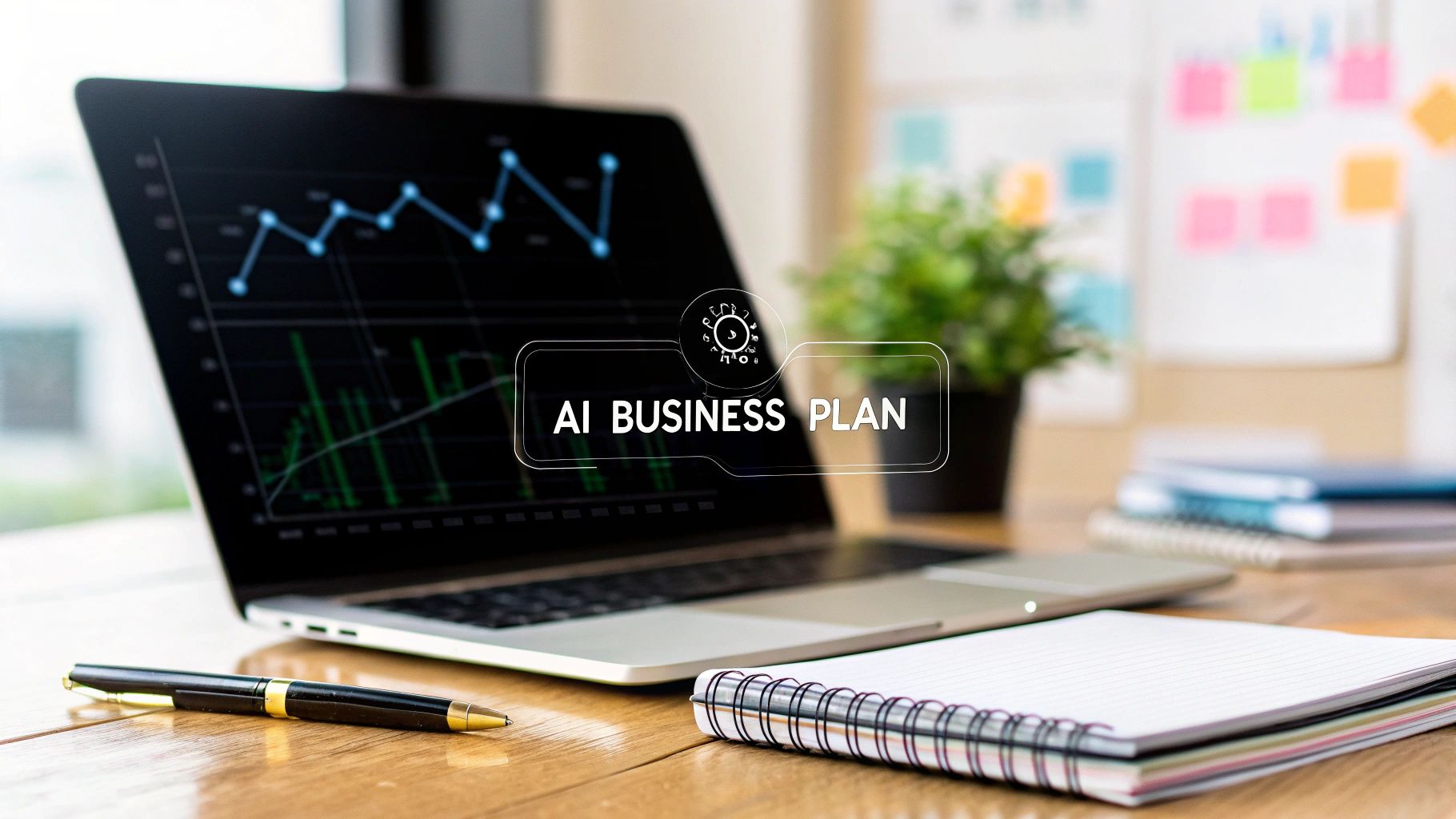An AI business plan generator isn't just another software tool; think of it as a strategic partner for small entrepreneurs. It uses artificial intelligence to take your raw business idea and flesh it out into a complete, professional business and marketing plan. The best part? It does the heavy lifting for small business owners—market research, writing, and financial forecasting—in minutes, not months, creating a bank-ready document almost instantly.
Turn Your Idea Into a Plan in Minutes

What if you could take that brilliant idea you just had and see it as a fully-formed business plan before you even finish your morning coffee? That’s exactly what an AI business plan generator makes possible for today's entrepreneurs. This guide will pull back the curtain on these tools, showing you how they can act as a co-pilot for your small business journey.
We’re going to look at how AI is democratizing business planning. No longer is this a skill reserved for those with a fancy business degree. These platforms go way beyond simple templates, offering data-backed insights to help you create a credible roadmap for securing funding, launching, and scaling your venture from the very start.
The New Standard for Small Business Planning
Let's be honest, the old way of writing a business plan is a huge headache for most small business owners. It's slow, complicated, and can be downright expensive if you hire help. An AI generator flips that entire process on its head.
All it needs is your core idea. You describe your vision—say, a new local coffee shop—and the AI gets to work, building out every section from the business model to the marketing plan. To get a real sense of what this looks like, check out this complete sample plan for a coffee shop at https://growth-grid.ai/samples/coffee-shop. It shows just how detailed and professional the final output can be for a small enterprise.
Old School vs. New School: A Quick Comparison
To really see the difference, it helps to put the two methods side-by-side. The traditional route is manual and often linear, while the AI-powered approach is dynamic, fast, and iterative, which is perfect for a nimble small business.
Here’s a breakdown of how they stack up:
Traditional Planning vs AI-Powered Planning
| Aspect | Traditional Business Planning | AI Business Plan Generator |
|---|---|---|
| Time Investment | Weeks or even months of research and writing. | Minutes to a few hours for a first draft. |
| Cost | Can be high if hiring consultants or market researchers. | Low monthly subscription or one-time fee. |
| Research | Entirely manual, relying on search engines and reports. | Automated, pulling from vast real-time datasets. |
| Financials | Requires complex spreadsheet skills or an accountant. | Projections are generated automatically from your inputs. |
| Flexibility | Difficult to pivot; major changes mean starting over. | Easy to revise and generate new versions instantly. |
As you can see, the AI approach removes major barriers, allowing a small entrepreneur to focus on strategy and execution rather than getting bogged down in the mechanics of document creation.
The real magic is the blend of speed and quality. With these tools, you can:
- Test your business model fast by seeing what a full plan looks like in minutes.
- Get a complete marketing plan that’s actually relevant to your local market.
- Create realistic financial projections without wrestling with spreadsheets.
- Sharpen your business model with smart, AI-driven suggestions.
A recent survey found that 87% of entrepreneurs who used an AI generator felt their final plan was not just faster to create but also higher quality than one made the old-fashioned way. Many reported getting their first draft done in minutes, with some tools boasting an average completion time of just 1.6 minutes. You can dive deeper into these findings by exploring the advancements in AI business planning.
How an AI Turns Your Idea into a Real Strategy
It’s easy to mistake an AI business plan generator for a fancy fill-in-the-blank template, but it’s so much more than that. Think of it as a strategic partner. It uses sophisticated tech like natural language processing (NLP) and machine learning to take your raw idea and build it into a detailed business and marketing plan.
You're the entrepreneur with the vision. The AI is your team of expert researchers, analysts, and writers, ready to do the heavy lifting. All you have to do is provide the core concept. The AI then gets to work, interpreting the meaning behind your words, not just copying and pasting generic text. For a small business owner, this means you can describe your idea naturally—just like you would to a mentor—and the AI gets it.
From a Simple Prompt to a Full-Fledged Plan
So, what happens behind the curtain? The process starts with deconstruction. The AI takes your initial input, something like "a mobile coffee cart specializing in corporate events," and immediately starts breaking it down. It identifies the industry (food service), the business model (B2B, mobile), and the target customer (corporate clients). This first step is the foundation for everything that comes next.
Once it grasps the basics, the AI taps into vast databases packed with information. It scans current market trends, looks at what's worked for other small businesses in your field, and pulls up typical financial benchmarks. It’s like having a whole market research team on call, instantly gathering the exact data needed to shape your strategy.
This infographic breaks down how the tool processes your idea and turns it into a document you can actually use.

As you can see, the journey from your simple input to a polished, strategic output involves some serious analytical work under the hood.
Building Out the Framework of Your Business
With the research done, the AI switches from analysis to creation. It starts drafting each section of your business plan, using all those data-driven insights to tell a story that’s unique to your business.
- Market Analysis: It’ll pinpoint your main local competitors and help you define what makes your business stand out—your unique selling proposition.
- Marketing Plan: Instead of generic advice, it suggests specific marketing channels that will actually reach your ideal customers, whether through social media, local SEO, or community events.
- Financial Projections: The tool generates realistic forecasts for revenue, outlines startup costs for a small business, and creates cash flow statements.
It's this blend of your idea with hard data that makes the final document so effective. The best tools use advanced NLP models that can take just a few sentences and flesh them out into a comprehensive, industry-specific business plan. This approach makes the plan incredibly accurate by weaving market analysis, competitor insights, and financial forecasting into the very first draft. You can get a better sense of how top AI tools generate business plans by seeing how they structure this process.
Think of the AI as a master chef. You provide the main ingredient—your idea—and it perfectly combines it with market data, financial models, and marketing tactics to create a bank-ready recipe for success.
The final output isn't just a collection of words. It's a cohesive, data-backed strategy built from your vision. You get a credible, actionable roadmap to launch and grow your small business.
What’s Actually Inside an AI-Generated Business Plan?

So, what do you get when you use one of these AI tools? It's less like a single, static document and more like a complete strategic kit for your small business. The AI takes your core idea, weaves it together with real-world market data, and builds a business model and marketing plan that makes sense from start to finish.
Right at the top, you'll find the Executive Summary. Think of this as your business's elevator pitch. It’s a short, punchy overview of the entire plan, designed to hook a local banker or investor from the very first sentence. This is where AI really shines—it can distill complex ideas into a clear and compelling summary.
From there, the generator gets to work on the foundational pieces of your strategy. Each section has a job to do, and they all fit together to give a full 360-degree view of your venture.
Your Core Strategic Components
An AI business plan generator doesn't just guess or fill in a template. It builds a logical structure, starting with the big picture and then drilling down into the details, making sure every part supports the others. For a small business owner, this means you end up with a document that's both thorough and easy to follow.
Here are the main building blocks you can expect:
- Market Analysis: This is where you get to know your customer inside and out. The AI will dig into the industry, size up your local competitors, and show you exactly where your small business fits in. It uses current data, giving you an honest look at your odds of success.
- Operations Plan: How will you actually run the business day-to-day? This section maps it out. It covers your processes, who’s on your team, and what tools or tech you’ll need to keep things running smoothly.
- Marketing and Sales Strategy: This is your game plan for finding and keeping customers. The AI will suggest the best channels to reach them, how to price your offerings, and what sales approaches work for your specific market.
The magic of an AI-generated plan is how it connects everything. Your market research informs your financial goals, and your marketing plan is built to work with your operational reality. It’s a truly integrated strategy for your small business.
To give you a clearer picture, here’s a quick breakdown of what each section does for you.
Key Sections in Your AI-Generated Plan
| Plan Section | What It Is | Why It Matters for Your Small Business |
|---|---|---|
| Executive Summary | A concise, high-level overview of the entire business plan. | It’s your first impression. A strong summary gets you in the door with banks and partners. |
| Market Analysis | A deep dive into your industry, target customers, and competition. | It proves there's a real need for your product and that you understand the local competitive landscape. |
| Operations Plan | The blueprint for how your business will function daily. | It shows you've thought through the practicalities of delivering on your promises. |
| Marketing & Sales | Your strategy for reaching, converting, and retaining customers. | This is your roadmap to generating revenue and growing your customer base. |
| Financial Projections | Detailed forecasts of your startup costs, revenue, and profitability. | The numbers tell the story. This section demonstrates that your business is financially viable. |
Each of these pieces is crucial for building a business plan that not only looks good on paper but also works in the real world.
Financial Projections and Proving Your Business Model
The numbers part is often the most intimidating for an entrepreneur, but it’s arguably the most important. This is where an AI tool can be a massive help, taking the guesswork out of financial modeling. If you really want to dig deep, it's worth reading up on mastering your business plan's financial projections to get a handle on the fundamentals.
An AI generator will typically create these key financial reports for your small business:
- Startup Costs: A clear list of all the one-time costs you'll face just to get the doors open.
- Profit and Loss (P&L) Statement: This projects your income and expenses over time, usually for the first three to five years, to show when you'll become profitable.
- Cash Flow Statement: This tracks the actual money moving in and out of your bank account. It's critical for making sure you can pay your bills on time.
- Balance Sheet: A simple snapshot of what your company owns and what it owes at a single moment in time.
These aren't just random numbers. The AI uses industry benchmarks and your specific business details to build a realistic financial picture for your business model.
Before you go all-in, it's a good idea to run a quick check to see if your idea holds water. You can learn more about this by seeing how to complete an AI-powered feasibility study at https://growth-grid.ai/docs/feasibility-study.
Strategic Advantages for Small Businesses

If you're a solo entrepreneur or running a small team, an AI business plan generator tackles some of your biggest headaches right away. This isn't just about saving a bit of time; it's about gaining a genuine strategic upper hand where it counts.
The first thing you'll notice is the incredible time savings. Think about it: instead of losing weeks to research, spreadsheets, and endless drafts, you can have a comprehensive, polished business plan ready to go in an afternoon. This gives you back your most precious asset—time—to actually build the business you're planning.
More Than Just a Document
Speed is great, but the cost savings are just as compelling for a small business. Bringing in a consultant to write a business plan from scratch can set you back thousands of dollars, which is a non-starter for most new ventures. AI tools deliver a professional-grade document for a tiny fraction of that price, putting top-tier planning within reach for every entrepreneur.
This accessibility also applies to the data itself. Most small businesses don't have a budget for deep market research or complex financial analysis. An AI business plan generator changes that, offering access to powerful insights that were once the exclusive domain of big corporations.
The precision these tools offer is impressive. Many AI applications in business planning are now hitting up to 99% accuracy on predictive tasks, like forecasting revenue or identifying market trends. That kind of accuracy helps you de-risk your venture by making smarter, data-informed decisions right from the start.
Building Confidence and Unlocking Opportunities
Let's not forget the confidence boost that comes from having a truly professional business plan. It forces you to sharpen your business model, clarify your marketing plan, and get ready for the tough questions that will shape your company's future. When you have a solid plan, you can walk into any meeting with a banker or partner and speak with real authority.
For any small business or entrepreneur, the core benefits are straightforward:
- Massive Time Savings: Condense weeks of work into just a few hours.
- Significant Cost Reduction: Avoid the steep fees of professional consultants.
- Data-Driven Insights: Tap into market research and financial analysis that would normally be inaccessible.
- Increased Confidence: Approach lenders and partners with a clear, compelling vision for your business model.
Using AI to generate your plan is a powerful move. It's also a great example of how AI-powered business intelligence is giving smaller players a real shot at competing in the big leagues.
Choosing the Right AI Planning Tool
Not all AI business plan generators are created equal. With new tools popping up all the time, picking the right one for your small business is a critical first step.
Think of it like choosing a vehicle for a road trip. You wouldn't take a two-seater sports car on a cross-country family vacation, and an RV would be massive overkill for a quick trip to the grocery store. The best tool is the one that actually fits your specific journey as an entrepreneur.
For a small business owner, this decision comes down to a few key factors. You have to look past the flashy marketing promises and figure out how a platform will genuinely support your unique business model. Your goal is to find a generator that acts more like a co-pilot in your planning, not just a glorified document-filler.
Evaluating Key Features
It’s easy to get lost in a sea of feature lists when you're comparing different AI planning tools. To cut through the noise, focus on the things that will have the biggest impact on the quality and real-world usefulness of your business plan.
Here are the essential criteria you should be looking at:
- Depth of Customization: How much control do you really have? A good tool gives you a solid first draft, but it absolutely must let you edit and refine every section to inject your brand’s personality and your own unique insights. Steer clear of platforms that lock you into a rigid, cookie-cutter template.
- Financial Modeling Robustness: Can it handle real numbers? Look for generators that create comprehensive financial statements—we're talking P&L, cash flow, and balance sheets. The ability to model different revenue streams and tweak cost assumptions is crucial for painting a realistic financial picture for your business model.
- Industry-Specific Templates: A generic plan simply won't do the job. The best tools offer templates built for specific small business types, whether you're in e-commerce, running a local service business, or launching a tech startup. This ensures the market analysis and financial benchmarks are actually relevant to your world.
User Experience and Support
The most powerful tool on the planet is useless if you can't figure out how to work it. As a busy entrepreneur, you don't have time for a steep learning curve; an intuitive, user-friendly interface is non-negotiable. The platform should feel like it's guiding you, not fighting you.
When you're trying out a tool, ask yourself one simple question: Does this make my life easier or more complicated? The right AI business plan generator should feel like a helpful assistant that simplifies your workflow and clarifies your strategy, not another complex task on your to-do list.
Finally, don't forget to check out the support system. Does the platform offer helpful guides, responsive customer service, or an active community forum? Knowing you can get help when you need it is a huge relief when you’re in the thick of the planning process. The choice you make here will shape more than just a document—it will build the strategic foundation for your entire venture.
Your Living Business Plan for Growth
One of the biggest mistakes a small business owner can make is treating their business plan like a homework assignment—you finish it, turn it in, and never look at it again. It's so easy to get that initial draft done, breathe a sigh of relief, and just file it away.
But the real magic of an AI business plan generator is that it doesn't just give you a document; it gives you a dynamic tool that can evolve right alongside your business.
Think of your plan less like a static blueprint and more like a strategic compass for your business model. It's meant to be pulled out often, checked, and adjusted as you navigate the very real, often unpredictable, waters of the market. This is how a simple document becomes your most trusted guide.
From Static Document to Strategic Compass
Your first AI-generated plan is a fantastic starting point, but the business world doesn't sit still. A new local competitor pops up. Your customers' tastes change. An incredible, unexpected opportunity lands in your lap.
This is where an AI tool really shines. Instead of rewriting everything from scratch, you can simply feed it the new information. Maybe it's updated sales figures, a brilliant idea for a new marketing channel, or a change in your supply costs. The generator can instantly recalculate and show you how these new variables affect your overall strategy and financial forecasts, letting you test out different scenarios and make smart decisions fast.
The true value of a business plan isn't in having it, but in using it. It should be the tool you lean on to set goals, track your progress, and make intelligent pivots when things change.
Putting Your Plan into Action
To get the most out of your business plan, you have to weave it into your day-to-day operations. It should be the thing that guides both your big-picture vision and your immediate next steps, making sure every move you make is aligned with your core goals.
Here are a few practical ways to keep your business plan alive and working for you:
- Set Quarterly Objectives: Take those big annual goals from your business plan and chop them into smaller, manageable quarterly targets. Your marketing plan section can outline specific campaigns for the next three months, while your financial section can set clear revenue milestones to hit.
- Inform Marketing Campaigns: Before you launch that next big campaign, pull up your market analysis. Does your messaging still connect with your target audience? Use the data in your plan to sharpen your marketing strategy.
- Guide Financial Decisions: Thinking about buying a new piece of equipment or expanding your team? Run the numbers through your financial projection model first. The AI can help you visualize the ripple effects on your cash flow and profitability down the road.
When you consistently update and refer to your plan, it stops being just a document. It becomes the engine that drives your small business toward real, sustainable growth.
Frequently Asked Questions
Jumping into new technology always sparks a few questions, especially when you're an entrepreneur who needs tools you can count on. Let's clear up some of the most common queries about using an AI business plan generator for your small business.
Can I Trust AI for a Bank Loan Application?
For the most part, yes. A plan from a solid AI business plan generator is usually more than strong enough to take to a lender. These tools are designed to build out the comprehensive documents banks expect from a small business, covering everything from the executive summary and market analysis to detailed financial projections.
Think of the AI's output as the foundation, not the finished product. You still need to be in the driver's seat. It's crucial that you review, edit, and inject your own local market knowledge and unique vision into the business plan before handing it over to a loan officer.
What Is the Typical Cost?
The price points are all over the map, which is great for small business owners. Some tools offer a free version that's perfect for just testing out a business idea. For more horsepower, most platforms run on a subscription model, usually somewhere between $15 to $50 per month, which unlocks deeper analysis and more advanced financial features.
When you put that up against the cost of a traditional business plan consultant—which can easily run into thousands of dollars—the savings are huge. It puts professional-level planning within reach for just about any small business or entrepreneur.
Have more questions? We’ve got more answers. Check out our full AI business plan generator FAQ page for a deeper dive.
Can I Customize the Generated Plan?
Not only can you, but you absolutely should. The best way to think about the AI-generated business plan is as a really strong first draft from an expert assistant. It gives you a data-backed structure and saves you a ton of time, but your personal insights as an entrepreneur are what will make it shine.
Every good AI planning tool is built with customization in mind. You'll have complete freedom to tweak the text, adjust the financial numbers, and add any sections you feel are missing. The goal is to refine that initial draft until it perfectly captures your strategic vision for your business model and marketing plan.
Ready to turn your idea into a professional, bank-ready strategy in just a few minutes? GrowthGrid uses advanced AI to build a comprehensive business and marketing plan for your small business. Save time, cut costs, and get the confidence that comes with a solid plan. Start building your business plan with GrowthGrid today
